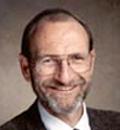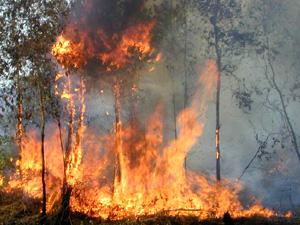CHICAGO, Illinois, February 16, 2009 (ENS)
Without decisive action by governments, corporations and individuals,
global warming in the 21st century is likely to accelerate at a much faster
pace and cause more environmental damage than predicted, warns a leading
member of the Nobel Prize-winning Intergovernmental Panel on Climate Change.
In a business-as-usual world, higher temperatures could ignite tropical
forests and melt the Arctic tundra, releasing billions of tons of greenhouse
gas that could raise global temperatures even more - a vicious cycle that
could spiral out of control by the end of the century, said IPCC scientist
Chris Field of Stanford University and the Carnegie Institution for Science.

Chris Field, PhD (Photo courtesyCarnegie Institution for Science)
Field presented his findings Saturday at the annual meeting of the American
Association for the Advancement of Science in Chicago during a symposium
titled, "What Is New and Surprising Since the IPCC Fourth Assessment?"
The IPCC Fourth Assessment, for which Field was a coordinating author, was
published in 2007.
"There is a real risk that human-caused climate change will accelerate the
release of carbon dioxide from forest and tundra ecosystems, which have been
storing a lot of carbon for thousands of years," said Field, a professor of
biology and of environmental Earth system science at Stanford, and a senior
fellow at Stanford's Woods Institute for the Environment.
"We don't want to cross a critical threshold where this massive release of
carbon starts to run on autopilot," he said.
This is a crucial year in the international effort to address climate
change. Intergovernmental negotiations will be taking place all year,
culminating in the United Nations Climate Change Conference in Copenhagen,
December 7-18. There, governments are expected to finalize a treaty to limit
greenhouse gas emissions that will take effect when the current Kyoto
Protocol expires at the end of 2012.
In their negotiations, governments rely on the facts presented in the
assessment reports published by the IPCC.
Established by the United Nations in 1988, the IPCC brings together
thousands of experts from around the world to assess the science and policy
implications of climate change.
The IPCC does not conduct any research nor does it monitor climate related
data or parameters. Its role is to assess on a comprehensive, objective,
open and transparent basis the latest scientific, technical and
socio-economic literature produced worldwide concerning the risk of
human-induced climate change, its observed and projected impacts and options
for adaptation and mitigation.
In 2007, the IPCC and Al Gore were awarded the Nobel Peace Prize. Field was
among 25 IPCC scientists who attended the award ceremony in Oslo, Norway.
In September 2008, Field was elected co-chair of Working Group 2, which is
charged with assessing the impacts of climate change on social, economic and
natural systems. One of his major responsibilities is to oversee the writing
and editing of the "Working Group 2 Report" for the IPCC fifth assessment,
slated for publication in 2014.
The fifth assessment will incorporate the results of new studies that
predict more severe changes than did previous assessments.
"The IPCC fourth assessment didn't consider either the tundra-thawing or
tropical forest feedbacks in detail because they weren't yet well
understood," he says. "But new studies are now available, so we should be
able to assess a wider range of factors and possible climate outcomes."
"The data now show that greenhouse gas emissions are accelerating much
faster than we thought," said Field. "Over the last decade developing
countries such as China and India have increased their electric power
generation by burning more coal. Economies in the developing world are
becoming more, not less carbon-intensive. We are definitely in unexplored
terrain with the trajectory of climate change, in the region with forcing,
and very likely impacts, much worse than predicted in the fourth
assessment."

Forest fire in Indonesia (Photo courtesy CIFOR/ICRAF)
New studies are revealing potentially dangerous feedbacks in the climate
system that could convert current carbon sinks into carbon sources. Field
points to tropical forests as a prime example.
Vast amounts of carbon are stored in the vegetation of moist tropical
forests, which are resistant to wildfires because of their wetness. But
warming temperatures and shifting rainfall patterns threaten to dry the
forests, making them less fireproof.
Researchers estimate that loss of forests through wildfires and other causes
during the next century could boost atmospheric concentration of the
greenhouse gas carbon dioxide by up to 100 parts per million over the
current 386 ppm, with possibly devastating consequences for global climate.
Warming in the Arctic is expected to speed up the decay of plant matter that
has been in cold storage in permafrost for thousands of years.
"There is about 1,000 billion tons of carbon in these soils," says Field.
"When you consider that the total amount of carbon released from fossil
fuels since the beginning of the Industrial Revolution is around 350 billion
tons, the implications for global climate are staggering."
"One thing that seems to be certain," he said, "is that as a society we are
facing a climate crisis that is larger and harder to deal with than any of
us thought. The sooner we take decisive action, the better our chances are
of leaving a sustainable world to future generations."
Field is founding director of the Department of Global Ecology at the
Carnegie Institution for Science, a private organization that conducts basic
research for the benefit of humanity.
The author of more than 200 scientific publications, Field's research
emphasizes impacts of climate change, from the molecular to the global
scale. His work includes major field experiments on responses of California
grassland to multi-factor global change, integrative studies on the global
carbon cycle, and assessments of impacts of climate change on agriculture.
Late last year, Field was elected an AAAS Fellow by the American Association
for the Advancement of Science. The AAAS said Field was elected "for his
central role in developing global ecology, with major contributions to the
global carbon cycle, climate-change impacts, and feedbacks of ecosystems to
climate change."
Copyright Environment News Service (ENS) 2009. All rights reserved.
To subscribe or visit go to: http://www.ens-newswire.com